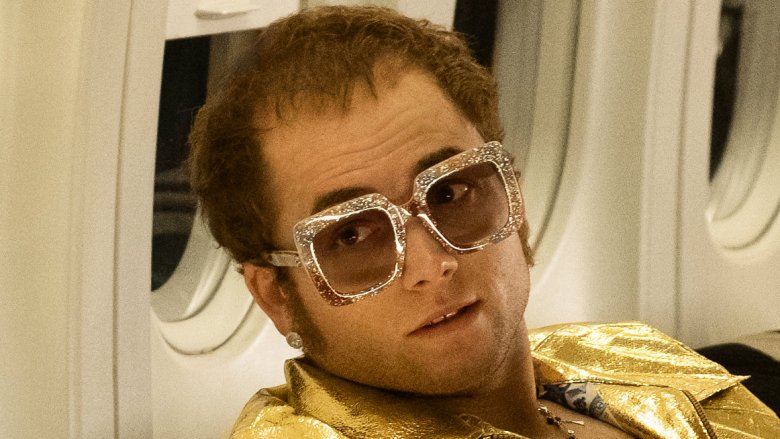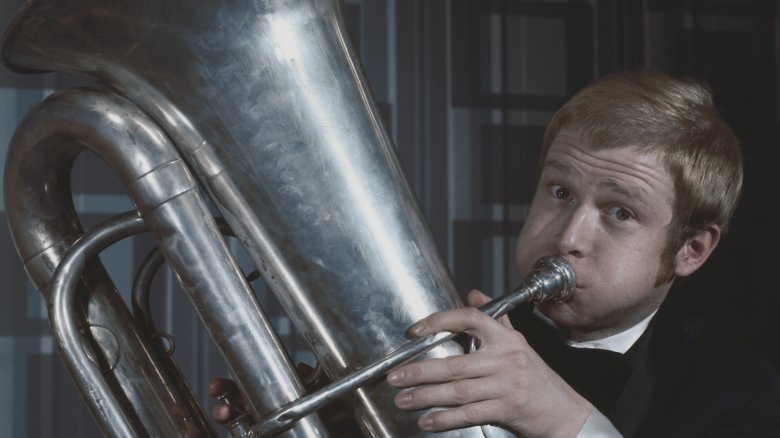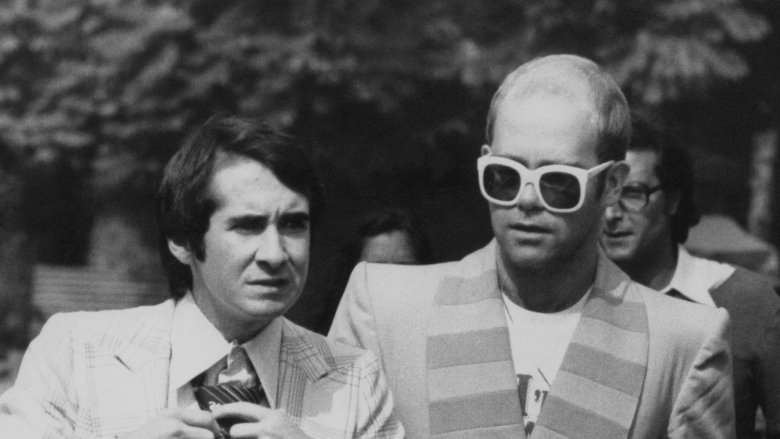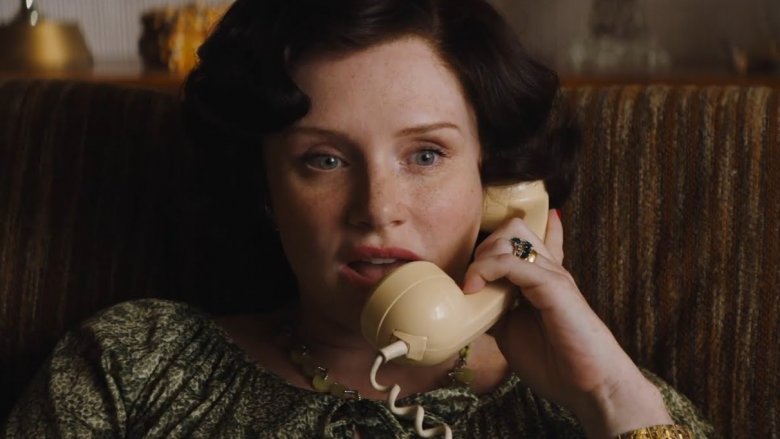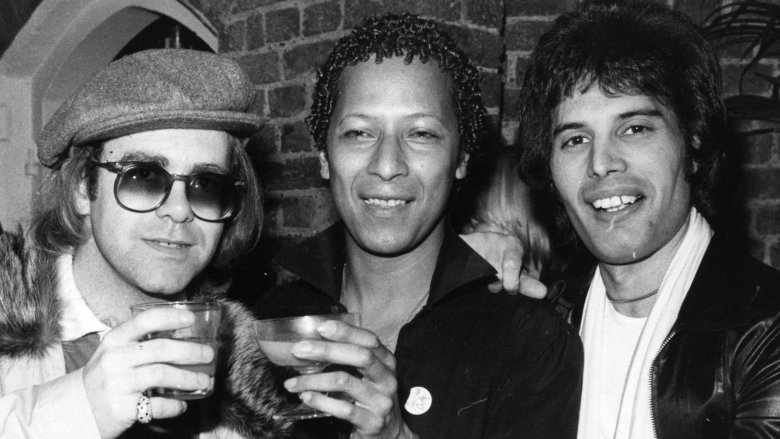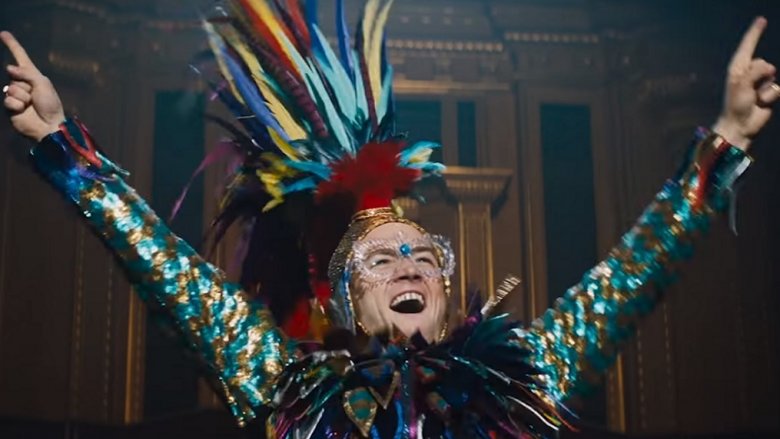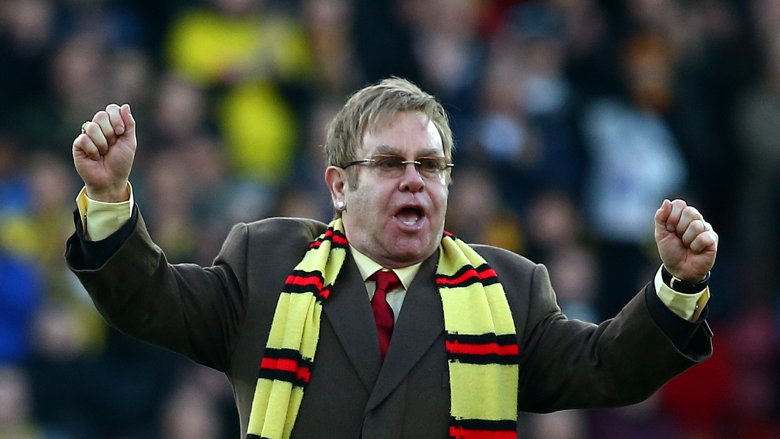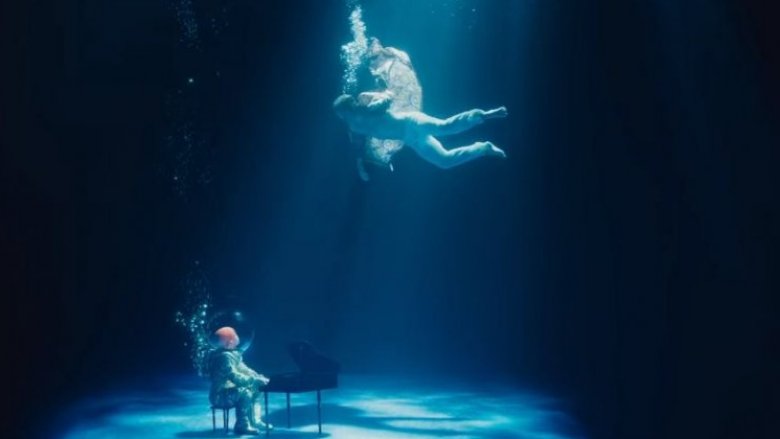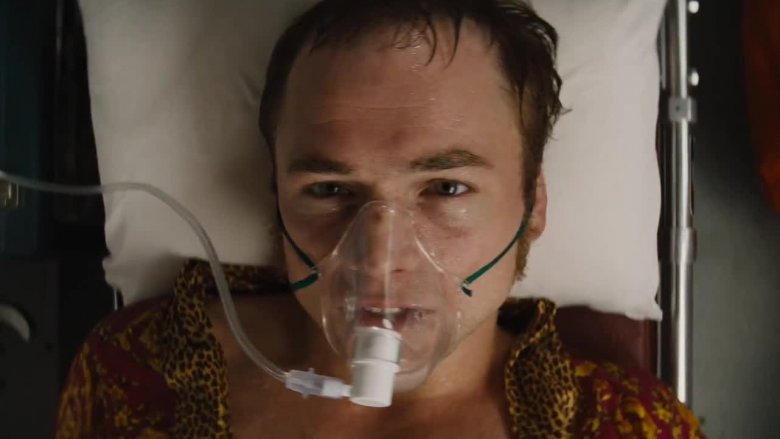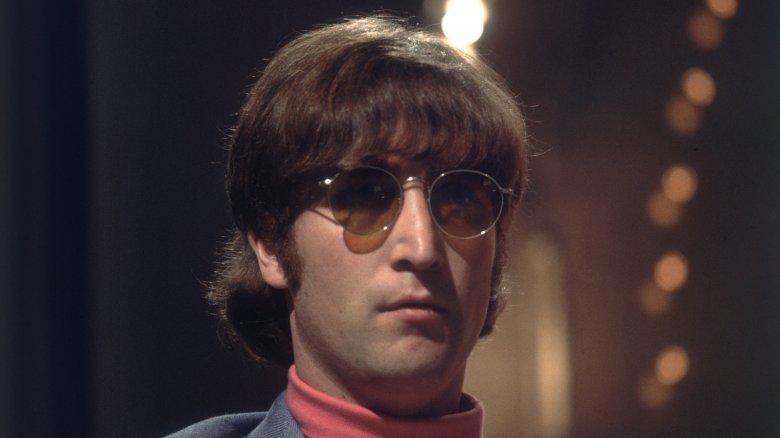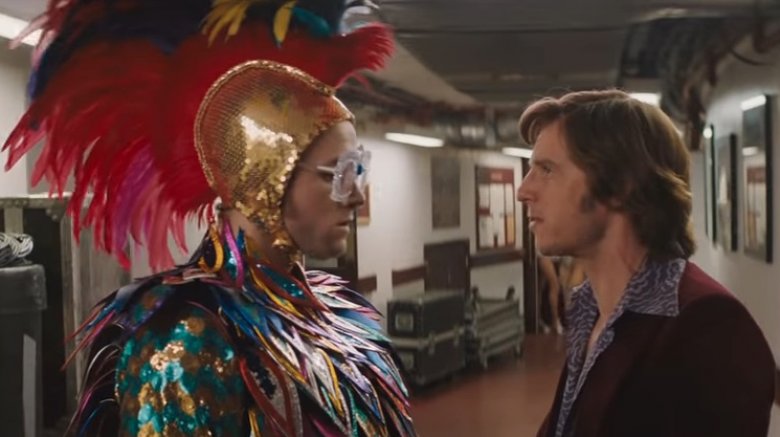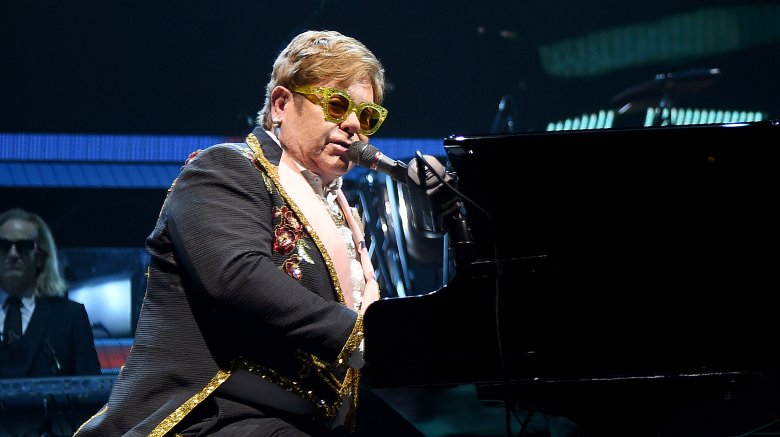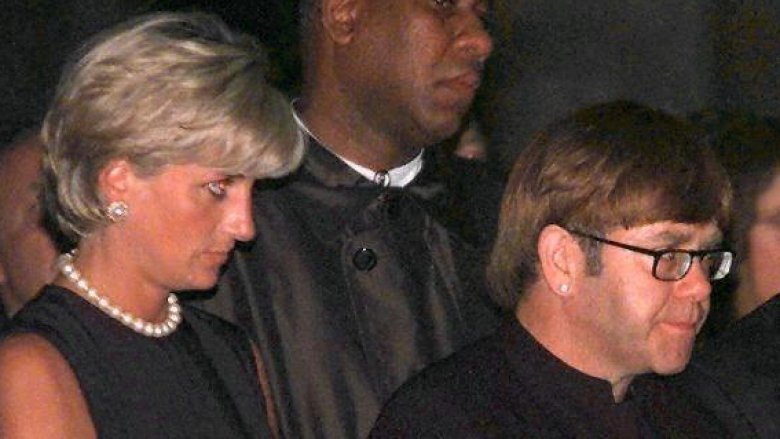How Rocketman Ignored Elton John's True Story
Biographical movies can be bland affairs that strive to present their target in a positive light, or at least smooth over the most awful parts of their history. Rocketman takes another approach: instead of the lukewarm water that is your average biopic, it offers Elton John's story in a tall, cool glass with a refreshing twist of lemon. And a generous splash of vodka. And a tray full of cocaine. Carried by a scantily-clad male model.
Instead of a conventional retelling of its subject's life and times, Rocketman proudly identifies as an "epic musical fantasy," and the more conventional parts of the story are intertwined with tight musical numbers and dreamlike, elaborately choreographed sequences. Of course, this approach comes at a price. While the movie does its level best to jog through the most important narrative beats of John's early stages and the most eventful (read: drugged-out) years of his career, the copious fantasy elements make it impossible to include more than a fraction of the artist's life and times. Unfortunately, this means some of the most important people and events of John's life are conspicuously absent from Rocketman. Let's take a look at how the movie ignored Elton John's real story.
Beware: Here be spoilers.
Whatever happened to Long John Baldry?
One of the most glaring omissions in the first third of Rocketman is Long John Baldry, whose 6'7" frame is nowhere to be found. If you're wondering why an Elton John biopic would include a giant pirate, don't worry — according to On This Day, Baldry was merely a popular musician who enlisted John's band Bluesology as his E Street Band before John left to shape his own destiny.
Baldry is a significant character in the Elton John lore because from 1967 to 1969, the very much closeted John was in a relationship with Linda Woodrow. They were scheduled to get married, but John grew increasingly desperate and unhappy, even contemplating suicide. At that point, Baldry stepped in, telling John to forget suicidal thoughts, embrace his sexuality, and call off the wedding. Although he didn't come out of the closet just yet (and wouldn't until 1988), John took the advice. Baldry's influence loomed so large that he and Bernie Taupin later immortalized him in the 1975 song "Someone Saved My Life Tonight."
Rocketman gives us a diluted version of this story, but gives Baldy's crucial role to Taupin. While this is somewhat understandable because the lyricist was present during Baldry's pep talk, it's still strange that the movie chooses to completely omit a man who so influenced Elton John's formative years.
If you or anyone you know is having suicidal thoughts, please call the National Suicide Prevention Lifeline at 1-800-273-TALK (8255).
The John Reid aftermath
As Paul Prenter from Bohemian Rhapsody will tell you, a music biopic needs an antagonist, whether or not its hero actually had one. Rocketman's bad guy is John Reid, the sharp-dressed, handsome businessman who seduces Elton John and takes over as his manager before John has a chance to find out what a cold, calculating monster he really is. What's worse, he can't get rid of Reid because their contract is foolproof. Rocketman eventually allows Reid to shimmer out of focus (so he can presumably go on being a smug, rich sociopath without ever facing retribution) as it shifts its focus to the real villain of the story: addiction.
Real life, as always, is another matter. The actual John Reid — who the Daily Record notes was not quite as villainous as the movie makes him seem — was virtually joined at the hip with John for three decades, first as a lover and then as a manager. According to the Times and The Guardian, this ended in a bitter court battle in 2001, after some of Reid's correspondence leaked to the press and John became convinced that the manager had turned into a mismanager. Reid eventually paid John a $2.54 million settlement, and John cut all connections to his longtime associate, to the point that he pretended Reid didn't exist.
The missing brother from another father
At its core, Rocketman is a story about family and the quest for familial love. Elton John's difficult relationships with his mother and father receive copious screen time, and the members of his extended family are all over the screen — his grandmother here, his stepfather there, and there's even a scene featuring his young half-brothers from his estranged father's new marriage. When John patches things up with Bernie Taupin at the end of the movie, their mended relationship is underlined when Taupin specifically identifies himself as John's brother.
With such emphasis on family and brotherhood, it's more than a little odd that the movie doesn't even bother mentioning that John actually does have a brother — well, a half-brother — from the family he actually grew up with. The Queensland Times reports that John's mother Sheila Farebrother and his stepfather Fred have a son called Frederick, who is conspicuously absent from Rocketman. Seeing as the movie makes it clear that Fred Farebrother is a reasonably stand-up guy and a supportive stepfather to John, you'd think his offspring with John's mother would at least warrant a mention. Maybe Frederick was aware of John's tumultuous temper and didn't want to risk ending up in a movie where his Rocketman counterpart gets punched in the nose during "Saturday Night's Alright for Fighting."
The famous and the absent
Rocketman goes to some lengths to portray Elton John as a man who is always alone, even when he's surrounded by people. After he becomes Elton John, his lyricist Bernie Taupin (and to a limited degree, his first manager Ray Williams and one-time wife Renate Blauel) is the only even mildly positive force in his life until he decides to get sober. While this is no doubt true in the "everyone's ultimately alone, guys" sense, it implies that he had no true friends. We know this to be patently untrue, because some of his friends were very, very famous.
As the Independent tells us, John was very close friends with Queen's Freddie Mercury, who was ironically portrayed in a similar, if slightly more family-friendly, way in Bohemian Rhapsody. Even in his final days, Mercury took the time to arrange the delivery of a particularly thoughtful Christmas present to John — a painting by one of his favorite artists. Another good rock friend is Rod Stewart, who The Morning Bulletin reports has known John for five decades. Like all great mates, the pair regularly snipe at each other with humor, filthy insults, and elaborate practical jokes. Mercury and Stewart also knew each other, and the trio got along so well that according to Ultimate Classic Rock they once briefly considered forming a drag trio called "Nose, Teeth and Hair." Can you guess who was who?
Closet door half open
Rocketman is not particularly big on the concept of Elton John's bisexuality. In the movie, he tries his hand at passing himself off as one for all of one scene, and his musician drinking buddies almost immediately dismiss the very idea. This is possibly a nod to the modern John's "out and proud" attitude and status as a gay icon, but in real life, his closeted phase lasted slightly longer. As Ultimate Classic Rock attests, he did not come out until 1976, and even when he did, it was as a bisexual. In fact, he didn't officially come out as a gay man until 1988, when he divorced Renate Bleuel. That's a lot of closet to condense into one offhand sentence, Rocketman.
To be fair, John had certain professional reasons to keep that closet door closed, and the movie uses the villainous John Reid to stealthily convey them. In one scene, Reid outright tells the enamored John that they must keep their relationship secret, because the backlash from the reveal could end John. Indeed, when the musician gave his "I'm bi" interview in 1976, his album sales temporarily dropped.
The missing obsession
Rocketman is extremely honest about the many, many vices of Elton John. In fact, Taron Egerton's John pretty much starts the movie by rattling off his assorted addictions and issues: alcoholism, drug addiction, bulimia, sex addiction, and even shopping addiction. As the movie progresses and the character spirals out of control, he even tells a (hopefully) hyperbole-laden version of the list to his own mother, now updated with things such as "I've f**ked everything that moves." Despite this ready admission of his many Things with a capital T, there's one that even this movie doesn't dare touch: soccer.
The 18 tells us that John has followed his favorite club, Watford FC, since childhood. As time progressed and his finances allowed, he moved from the mild stuff (watching matches as a supporter) to harder substances (actually owning the club and being its chairman on two different occasions, and lifting it to the top flight of English football from the fourth). The BBC reports that his role is more laid-back these days, though he's still the honorary chairman for life and has a stand at the club's stadium named after him.
It's understandable why this side of John didn't make it into Rocketman — after all, a hearty game of soccer midway through the movie might have disrupted the narrative of a drug-fueled, tortured artist. Still, it's a little strange to see such an important part of life completely handwaved.
The oven affair
The central scene of Rocketman is arguably Elton John's dramatic suicide attempt (which happened in 1975, for those paying attention to the timeline). In the movie, the drunken John downs a handful of pills and theatrically attempts to drown himself, which is awful — but also a perfect cinematic excuse to transition into a musical number featuring the film's namesake song. Yeah, it's that kind of movie.
The movie treats the pool suicide attempt as a one-off thing. It was not. Boston.com recalls that in 1968, there was a significantly less flamboyant one where he attempted to asphyxiate himself by sticking his head in a gas oven due to his despair over his engagement with Linda Woodrow. Bernie Taupin walked in to find his friend in the middle of act, though the effect was somewhat spoiled by the fact that Elton had set the gas on low with all the windows open, and was even resting his head on a pillow ... as well as the fact that Taupin couldn't stop laughing at the sight. Uh, actually, it's pretty understandable why this one didn't make it in the film.
If you or anyone you know is having suicidal thoughts, please call the National Suicide Prevention Lifeline at 1-800-273-TALK (8255).
Hugh who?
There can be only so many characters in a movie, so perhaps it's understandable that Hugh Williams never had a chance to shine in Rocketman. The movie depicts John's decision to seek treatment for his assorted addictions as a spontaneous, self-imposed decision, but in real life, a good chunk of the epiphany that led John to said decision came from Williams.
Excerpts from John's book Love is the Cure reveal that while Williams wasn't the only one to set John on the path to sobriety (his friendship with a young AIDS patient named Ryan White was also instrumental), he played a large role in lifting John from his addiction groove. As the 1980s turned into 1990s, Williams was John's boyfriend and a fellow addict. It was he who first announced he wanted to get clean, and he who first went to rehab. John initially took this as a giant insult in the classic "if you say you're an addict, then you're saying I'm an addict" sense, but eventually reconnected and met Williams in a halfway house. Their tense meeting involved a counseling tactic where they had to read a list of each others' worst traits. John felt Williams was untidy, didn't put CDs back in the case, and left the lights on when he left the room. Williams countered by rattling out a full page of John's many awful vices, shaking the musician to his core. Through his tears, John agreed to seek help.
Lennon's off the wall
John Lennon's role in Rocketman is somehow both much larger and much smaller than it was in Elton John's actual life. In the movie, Lennon is the inspiration for the "John" part of Elton John when the latter only has the "Elton" part down and has to quickly improvise a surname. This is not true in the slightest — the "John" actually refers to Long John Baldry — but the film also completely ignores the fact that Lennon was very much a part of John's life.
According to the Irish Examiner, the two superstars very much knew each other, and were on such good terms that John (the Elton one) says they hung out "for a couple of years." They were certainly good enough friends that Lennon's last onstage performance before his death was at an Elton John show in 1974, due to a lost bet. However, the famously acerbic Lennon was enough to make even Elton John nervous: while the ex-Beatle was never anything but pleasant toward the Rocket Man, John has admitted he was rather intimidated by Lennon's reputation as a potentially abrasive guy. Actually, there's an idea for a possible Rocketman sequel: Just Lennon and John, hurling increasingly snide insults at each other for two hours. Academy Awards, ahoy!
That Bernie breakup
Long-term soulmates are rare in any avenue of life, let alone the fickle music industry. Perhaps that is why Rocketman leans pretty hard on the relationship between Elton John and Bernie Taupin, and emphasizes the way it's falling apart at the seams when John's assortment of addictions get the better of him. In the movie, Taupin leaves the partnership a couple of times: once at the height of their first fame tsunami, as the partying becomes too much for him, and the other time near the end of the movie, when John's partying becomes too much for him. He doesn't return after that second one until John seeks help for his addictions, and promptly restores the artist's confidence with some brotherly words and a stack of fresh lyrics.
It's true that the real John and Taupin had a timeout at one stage of their career, but as Ultimate Classic Rock describes, it was a significantly more mundane affair than the movie would have you believe. The pair "broke up" for a while in the late 1970s, but this was chiefly so they could collaborate with other people for a while, and they were soon back on fold. As for the second "breakup," Taupin fully admits they had a creative slump in the late 1980s and early 1990s, but this was not because they had broken up or anything — it was simply because they had a lot of stuff going on and weren't communicating enough.
An instrumental change
Elton John's piano skills might be world class, but as with most artists, his voice is the thing people recognize when they hear it on the radio. As such, it's pretty distracting that Rocketman completely ignores one of the most dramatic events of his 1980s (not counting addiction issues or relationship troubles): his surgery-induced voice change.
Imagine the shock if Freddie Mercury had suddenly started singing with a completely different voice. As Ultimate Classic Rock attests, this strange scenario actually happened to John in 1987, when "spasmodic bouts of pain" (and a live album's worth of evidence that his voice wasn't what it used to be) forced him to seek medical help. As a result, something was removed from his vocal chords. The exact nature of his ailment has been speculated to have been throat cancer, described by his team as non-malignant lesions, and described by John himself as "cancerous ... whatever." Regardless of the true culprit, the operation altered John's voice to a direction that greatly pleased the man himself, but disheartened a portion of his fans. While John could now sing more fully than ever before, he had lost some of his famous falsetto.
A royal affair
Rocketman's only nod to the existence of British royalty comes in the form of a quick aside where a character notes the Queen Mother is an Elton John fan. While this is no mean feat, it also deftly sidesteps the fact that John has been hobnobbing with the royals pretty much ever since he had his breakthrough.
As Harper's Bazaar describes, the artist has been a member of the royal family's inner circle since 1970, thanks to the aforementioned Queen Mother and Princess Margaret taking a liking to his music. He became friendly with Princess Margaret to the point where they attended art events together, and even danced jive with the Queen herself on at least one occasion. In 1981, he added Princess Diana to his friendship notebook (royal edition), and later her sons as well. Overall, John's been a permanent fixture on the royal family's guest list for decades, save for a speed bump in 1997 because of his coffee table book Rock and Royalty, which sent him into a temporary "deep freeze."
